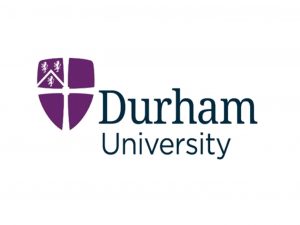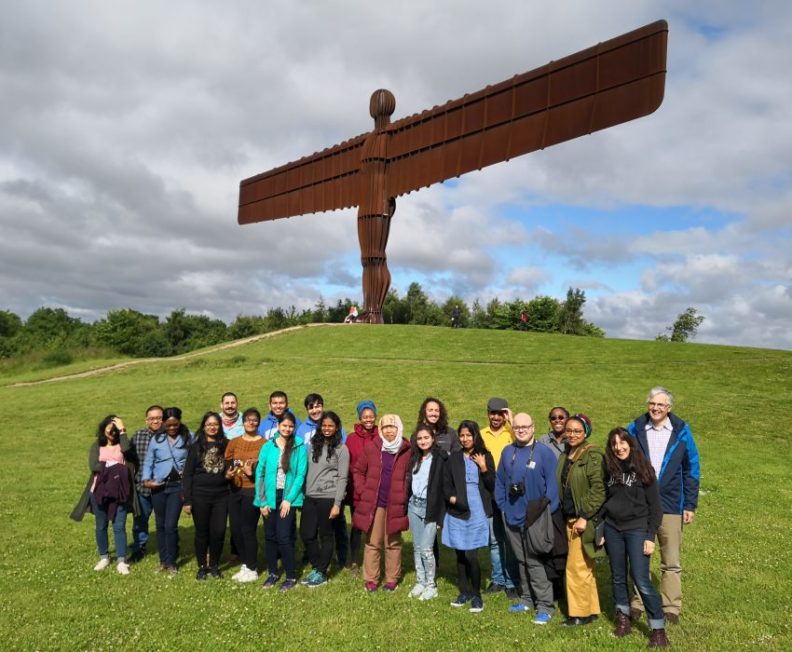Ripples that will make a Difference

Ripples that will make a Difference
On 25th November 2019, the Durham GCRF CDT were invited to the launch of just IMAGINE if…2020, hosted by Durham University, Business School. Below some notes following the event:
If a wind blows steadily across a large enough patch of water for a few hours then ripples become waves. A wave is a disturbance that propagates, or moves from the place it was created. In equation form the speed of the propagation of a simplified wave is given by V = λ/T which denotes the distance the wave travels in a given time, where λ is the wavelength and T is the time period. This fundamental relationship holds for all types of waves. For water waves, V is the speed of a surface wave; for sound, V is the speed of sound; and for visible light, V is the speed of light, for example. So what can we do with this theoretical equation?
Will Butler-Adams, CEO of Brompton Bicycle, explains that while studying Mechanical Engineering he remembered that his lectures were full of theoretical equations and mathematical models. He emphasizes that it is important to transform these theories into something that will affect society and change people’s lives positively. He set up the ‘Campaign for Movement’ to work together to create healthier and happier cities in our crowded urbanised world by encouraging people to cycle using Brompton Bicycles. Designed for cities, these folding bicycles are portable, practical and compact so you can easily store them in small apartments. Their company makes about 50,000 foldable bicycles a year. Will tells us that the success of his company is due to a happy workforce; that staff need to have fun and to feel part of the company.
This is affirmed by Paul Lindley, founder of Ella’s Kitchen, an innovative organic baby food brand with a strong mission: to tackle childhood hunger and improve early-childhood nutrition. Paul stresses that a business is to improve people’s lives and to be successful all businesses need trust. Ella’s Kitchen is one of the UK’s first certified B Corporations, a new kind of business that is legally bound to balance purpose and profit. They are accelerating a global culture shift to redefine success in business and build a more inclusive and sustainable economy, and work towards reduced inequality, lower levels of poverty, a healthier environment, stronger communities, and the creation of more high quality jobs with dignity and purpose. Paul explains that his model for business comprises of the four Ls: living (paying the workforce living wages), loving (the staff need to love to come to work), learning (a business makes mistakes, we have to accept that and learn from the mistakes), and leaving a legacy (what does the business want to be remembered for). A successful business is not just about making profit; it needs to deliver impact too. During his presentation he shows us a video of over 40 years ago when Robert F. Kennedy questions the way in which in progress is measured in the USA: “The gross national product,” Kennedy said, “does not allow for the health of our children, the quality of their education or the joy of their play.”
The growth of people means the growth of products. Capitalism is said to have rescued hundreds of millions of people from poverty. However, capitalism means there is perpetual growth to accumulate capital and extract profit; it will collapse without growth, yet the pressure of continuous growth on a completely inflated planet will exceed the environmental limits and burst into disaster. Mike Barry, former Director of Sustainable Business at M&S, says that we need a new form of capitalism to promise a better future for all. He helped Marks & Spencer to develop and deliver Plan A, a way to help build a sustainable future by being a business that enables their customers to have a positive impact on wellbeing, communities and the planet through all that they do. They implemented this plan by imagining the world in 2025 and changing their business accordingly, rather than focusing on a short-term plan. Plan A supports three main goals: helping 10 million people live happier, healthier lives; transforming 1,000 communities; and becoming a zero-waste business, including managing sustainability in their properties and construction projects. M&S sources all of its electricity in the UK and the Republic of Ireland from renewable sources, a quarter of which are small-scale. In 2015 M&S launched the UK’s largest single roof mounted solar panel array at their Castle Donnington warehouse.
This brings us back to waves. Solar energy generated by the sun flows away in the form of electromagnetic wave radiation. Electromagnetic waves radiate in space described by a three-dimensional form of the wave equation. In 1839, a 19-year-old French physicist Alexandre-Edmond Becquerel, discovered that when he placed silver chloride in an acidic solution and exposed it to sunlight, the platinum electrodes attached to it generated an electric current. This process of generating electricity directly from solar radiation is called photovoltaics. Today, photovoltaics is probably the most common way to effectively use solar energy. Photovoltaic systems usually involve solar panels, a collection of dozens or hundreds of solar cells. With these equations and theories, scientists have collaborated with businesses to develop solar energy systems that operate without producing air pollution, water pollution, or greenhouse gases. Using solar energy can have a positive, indirect effect on the environment when solar energy replaces or reduces the use of other energy sources that have larger, negative, effects on the environment. However, to make some types of photovoltaic cells that convert sunlight into electricity, a small quantity of toxic materials and chemicals are used. Leaks of these materials are harmful to the environment.
During the tea break of the Launch Event, Divya Jain, one of the Durham GCRF-CDT students, explains that the lifespan of solar panels is typically between 20-25 years. The problem is that solar panels are disposed of after their life span. Apart from being harmful to the environment, they are also a huge risk for people’s health. The panels are a large amount of waste that are not easy to recycle. Some businesses advertise themselves as solar panel recyclers, but they actually sell the panels to secondary markets in nations with less developed waste disposal systems. Communities living near electronic waste dumps in Ghana, Nigeria, Vietnam, Bangladesh, Pakistan, and India have been primary e-waste destinations. Very few countries have photovoltaic specific waste regulations. Divya tells us that her research focuses on a whole lifecycle approach to solar PV in India: managing the operation, end-of-life, recycling and reuse of the panels.
Prof Susan Hart and Prof Kiran Fernandes express that Universities are a central part of the skills and innovation supply chain to businesses. Apart from quality, the supply chains need to embrace sustainability and need to have impact. These qualities can only be obtained through close collaboration and understanding between business, universities, investors, governments, NGOs and consumers to tackle the world’s most pressing issues.
On 25th November 2019 at 3.30 pm, Paul Lindley and Prof Louise Bracken officially launched the just IMAGINE if… 2020 competition. The competition, founded by Paul, is open to anyone across the globe who has a business idea that could help address at least one of the United Nations Sustainable Development Goals (SDGs). The winner will receive bespoke research and business support from Durham University Business School and other university researchers.
Ten shortlisted finalists will present their business idea in front of a panel of expert business leaders at the March 2020 final in Durham. We met last year’s winner Alexander Wankel; he has used the funds to develop Kai Pacha, which produces an eco-friendly milk substitute made from diverse varieties of quinoa and tarwi – two highly nutritious crops sourced from Peru. We were very excited to taste ‘MilQ’, soon this product will be in the UK shops!
Paul believes that you need to dream and dare to take a risk to make a simple idea a reality that can change the world for the better. Below is one of the two quotes that has helped boost Paul’s confidence to make a difference:
“Each time a man stands up for an ideal, or acts to improve the lot of others, or strikes out against injustice, he sends forth a tiny ripple of hope, and crossing each other from a million different centers of energy and daring those ripples build a current which can sweep down the mightiest walls of oppression and resistance.” (From Robert F. Kennedy’s speech ‘ripple of hope’, delivered at the University of Cape Town on 06.06.1966)
It was very thrilling to meet our inspiring guests; we are now looking forward to meeting the finalists of 2020 and to hear about their ideas – maybe one of our students will be among the contestants!
Thank you to Dr Tim Hammond and Dr Lara Small for including the Durham GCRF-CDT cohort in the just IMAGINE if … Launch Event
by Abir van Hunen
Header Photo by Marcio Chagas on Unsplash

